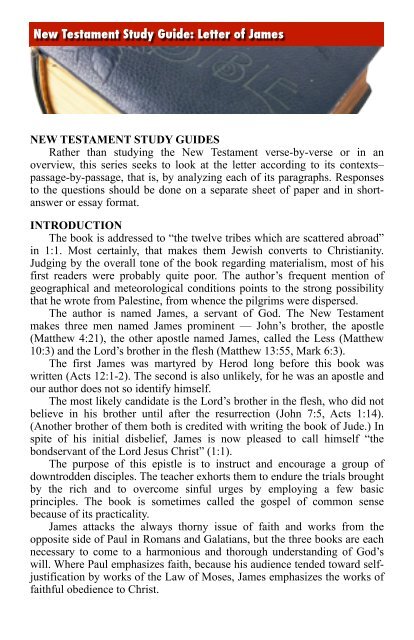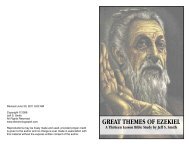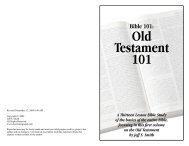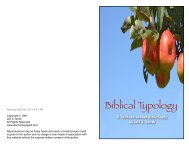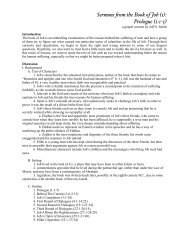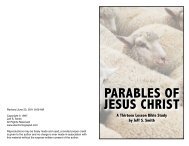New Testament Study Guides - ElectronicGospel
New Testament Study Guides - ElectronicGospel
New Testament Study Guides - ElectronicGospel
You also want an ePaper? Increase the reach of your titles
YUMPU automatically turns print PDFs into web optimized ePapers that Google loves.
<strong>New</strong> <strong>Testament</strong> <strong>Study</strong> Guide: Letter of James<br />
NEW TESTAMENT STUDY GUIDES<br />
Rather than studying the <strong>New</strong> <strong>Testament</strong> verse-by-verse or in an<br />
overview, this series seeks to look at the letter according to its contexts–<br />
passage-by-passage, that is, by analyzing each of its paragraphs. Responses<br />
to the questions should be done on a separate sheet of paper and in shortanswer<br />
or essay format.<br />
INTRODUCTION<br />
The book is addressed to “the twelve tribes which are scattered abroad”<br />
in 1:1. Most certainly, that makes them Jewish converts to Christianity.<br />
Judging by the overall tone of the book regarding materialism, most of his<br />
first readers were probably quite poor. The author’s frequent mention of<br />
geographical and meteorological conditions points to the strong possibility<br />
that he wrote from Palestine, from whence the pilgrims were dispersed.<br />
The author is named James, a servant of God. The <strong>New</strong> <strong>Testament</strong><br />
makes three men named James prominent — John’s brother, the apostle<br />
(Matthew 4:21), the other apostle named James, called the Less (Matthew<br />
10:3) and the Lord’s brother in the flesh (Matthew 13:55, Mark 6:3).<br />
The first James was martyred by Herod long before this book was<br />
written (Acts 12:1-2). The second is also unlikely, for he was an apostle and<br />
our author does not so identify himself.<br />
The most likely candidate is the Lord’s brother in the flesh, who did not<br />
believe in his brother until after the resurrection (John 7:5, Acts 1:14).<br />
(Another brother of them both is credited with writing the book of Jude.) In<br />
spite of his initial disbelief, James is now pleased to call himself “the<br />
bondservant of the Lord Jesus Christ” (1:1).<br />
The purpose of this epistle is to instruct and encourage a group of<br />
downtrodden disciples. The teacher exhorts them to endure the trials brought<br />
by the rich and to overcome sinful urges by employing a few basic<br />
principles. The book is sometimes called the gospel of common sense<br />
because of its practicality.<br />
James attacks the always thorny issue of faith and works from the<br />
opposite side of Paul in Romans and Galatians, but the three books are each<br />
necessary to come to a harmonious and thorough understanding of God’s<br />
will. Where Paul emphasizes faith, because his audience tended toward selfjustification<br />
by works of the Law of Moses, James emphasizes the works of<br />
faithful obedience to Christ.


